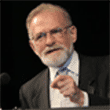The Future of Europe: Conversation with Prof. Bronislaw Geremek
 |
December 2005
By Ilmas Futehally
|

I was lucky to meet Prof Bronislaw Geremek, former Foreign Minister of Poland and currently a Member of the European Parliament during a recent visit to Brussels. The brain behind the Solidarity trade union movement, renowned European historian and one of the greatest advocates of the European dream, Prof Geremek remains largely optimistic about the future of Europe despite the present crisis.
Prof Geremek said that the future of Europe over the next 25 years depends on the short period in which Europe considers its enlargement and the place that the European Union can reach in the global scene. He believes that the Lisbon Strategy (a plan for the development of EU) ought to be rethought and its objectives have to match the challenges of globalisation and the changing world.
On the issue of enlargement, Prof Geremek said that Europeans are frightened of the next round of enlargements. The last round of enlargement of May 1, 2004, which brought 10 new countries in, the EU should have led to a greater vibrancy and high expectations for the future. Instead, the issue of enlargement has brought about fear- fear of inclusion of Turkey, a country with a different culture, a different religion. There is also fear about growing social problems, unemployment, and migration. He has the feeling that European integration is going a bit too fast for the European society. To be able to tackle the issues arising out of enlargement one needs to have a public debate on democracy and ideology, on cultural differences, on differences in material prosperity between the rich and the poor within the European Union.
Presently Poland’s per capita GDP is almost half of the rest of Europe. There are vast differences between the development levels of Latvia and Luxemburg, not to mention the countries that have been identified in the next round of enlargement- Romania, Bulgaria, Croatia and Turkey. But beyond the extension of geographical borders, Prof Geremek believes that enlargement takes place by extending one’s mind.
The crisis of the constitution of Europe is the most serious in the history of Europe, according to the professor and the manner in which it is handled will be one of the chief determinants of the future of Europe. At present the relationship between the institution and the citizens is being questioned. The citizens feel that the European Union is far away from their daily concerns. The EU has not managed to deliver the message that it cares about people. The debate about the constitution must continue, even if the French and Dutch referenda appear to have killed it. The debate should have a good framework with the commitment of civil society groups. Drafting a new constitution would require even more time than was needed for the current proposal and it is unlikely that the necessary changes could be introduced through an intergovernmental conference.
A viable way ahead would be to prolong the ratification deadline until 2008. Prof Geremek believes that this is not the time to change the draft’s text, but the third part, consisting of 200 pages, which cannot be understood by citizens, can be moved to an annex. The present task is to redefine the European project rather than to rewrite the constitution.
Prof Geremek also spoke about the “crisis in Euroland”. He said that some countries are contemplating withdrawing from the Euro. This would have a very disastrous effect. The present phase of low growth could be part of a cycle, but economic reforms in Germany will prove to be crucial, as the influence of the German economy on neighbouring countries is very high. He predicts the fall of the German Government (led by Angela Merkel) in the next two years. Turing his attention to France, Prof Geremek said that political confrontations in that country had blocked the economy. The problems of Italy’s incumbent government are known and the Prime Minister as well as the opposition candidate for Premier’s post is known to be reluctant to introduce reforms. Thus, the next two years will be very difficult for the Euroland. There will be a spate of elections until 2008 and the European Parliament elections will take place in 2009. Europe can recover once the remaining decade of uncertainty is over and Europe may shine in the next decade beginning 2010. However, it will all depend on how Europe manages its politics until then.
On the Europe - United States relations, Prof Geremek believes that relations will improve in the next two years, as the Republicans will be in an increasingly difficult position, facing strong adversaries in their Democrat colleagues. This will make the present administration turn to Europe for greater support.
Underlying most of what Prof Geremek said was the need to create a clear European identity and the need for people to believe in the benefits that Europe can bring to them- not just as nations, but also as individuals. The two world wars and the cold war shaped European integration as a project of peace, a defence of the West’s fundamental values and common economic prosperity. The new generation of Europeans do not consider the war in their frame of reference. Prof Geremek believes that the future of Europe will be secure only if peace and stability in Europe touch the lives of young Europeans. We have made Europe, he declared, now we have to make Europeans!
Related Publications
-
.jpg&maxw=50)
Big Questions of Our time: The World Speaks, 2016
Download:Big Questions of Our time: The World Speaks _Full Report
-

-

Second Freedom South Asian Challenge 2005-2025, 2005
read more
Download:Second Freedom South Asian Challenge 2005-2025 Full Report
Related latest News
Related Conferences Reports
-

Global Challenges Conference, October 2016
Download:Global Challenges Conference Report
-

Conference on Responsibility to the Future: Business, Peace and Sustainability, June, 2008
Download:Global Security and Economy: Emerging Issues


